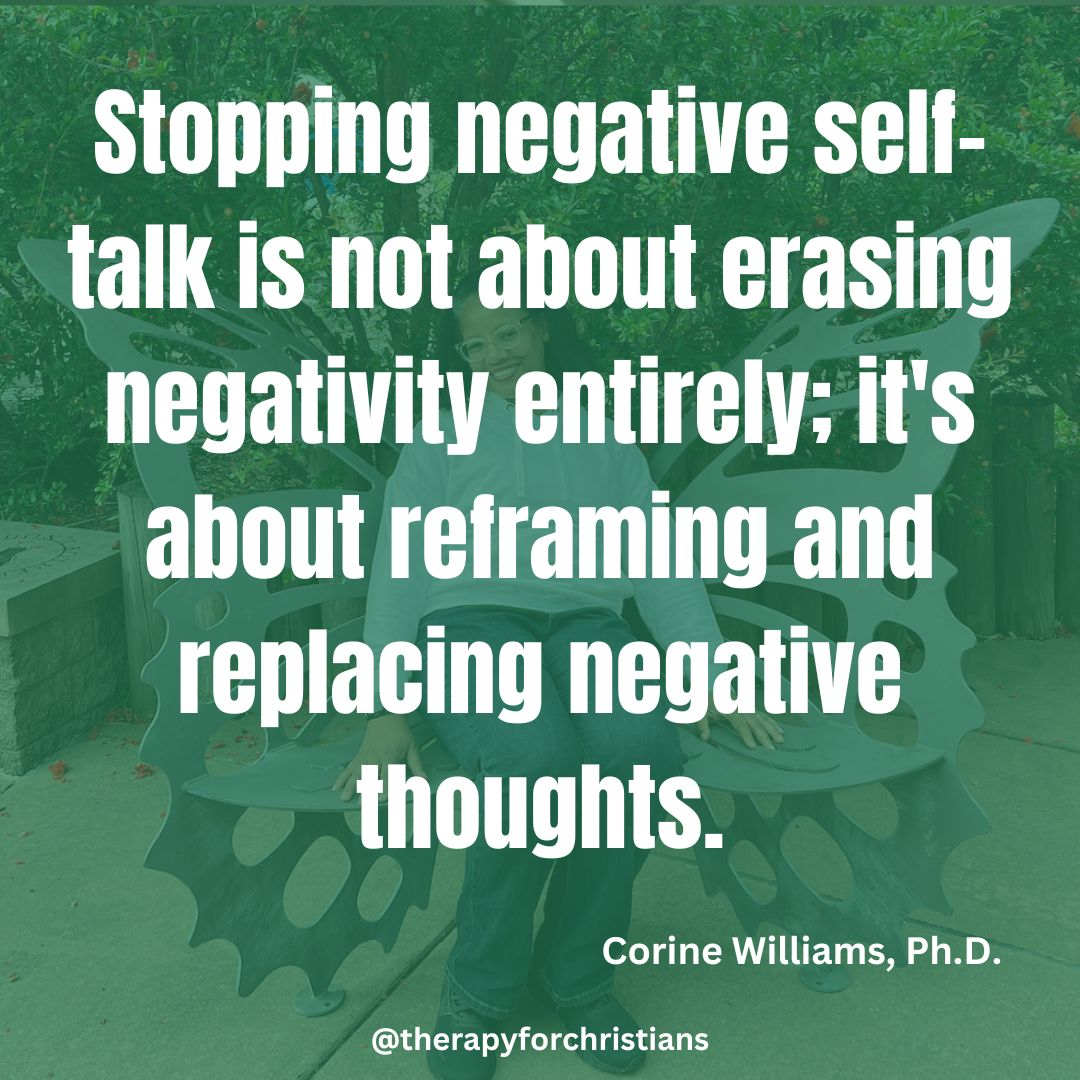

Negative self-talk, the inner voice that often feeds doubt, undermines confidence, and stifles growth, is a common enemy we all face at times. We’ve all heard it say that we’re not good enough, beautiful enough, or smart enough, but only some of us know how to stop it. This article is written to change that.
See, in the face of this harmful self-talk, we have the power to rewrite our story. By embracing self-awareness, and recognizing the power of our thoughts, we can shine a light on the patterns of thought that hold us back and replace them with empowering beliefs. Each moment of self-reflection then becomes a stepping stone towards a brighter, more resilient mindset.
Stopping negative self-talk is not about erasing negativity entirely; it's about reframing and replacing negative thoughts. So if you’re ready to overcome negative self-talk and open your mind to a greater way of living, keep reading.
 Like this Content on Facebook
Like this Content on Facebook
What is Negative Self-talk?
Negative self-talk is the complete opposite of positive self-talk. It's the internal dialogue or stream of thoughts marked by self-criticism, doubt, and negativity. It often manifests as harsh judgments, pessimistic predictions, and a tendency to focus on your flaws or perceived failures.
This detrimental inner monologue can undermine self-esteem, erode confidence, and contribute to feelings of anxiety, depression, and inadequacy.
This type of self-talk can take various forms, such as personalizing situations, catastrophizing outcomes, or filtering out positive aspects of one's experiences.
Ultimately, it shapes our perceptions of ourselves, others, and the world around us, influencing our emotions, behaviors, and overall well-being. For this reason, recognizing and addressing negative thinking is crucial for cultivating a more positive and empowering life.

What Are The 3 Cs of Negative Self-talk?
Identifying negative self-talk is easy. Negative thought patterns often follow the pattern of the "3 Cs": comparing, criticizing, and complaining.
Comparing:
Comparing involves measuring yourself against others, often leading to feelings of inadequacy or inferiority. This can occur in various aspects of life, such as career achievements, physical appearance, or social status.
Constant comparison fosters a sense of dissatisfaction and diminishes self-worth.
Criticizing:
Criticizing entails harshly judging yourself for perceived flaws, mistakes, or shortcomings. This internal critique is often relentless and unforgiving, amplifying feelings of self-doubt and unworthiness.
Criticizing yourself excessively undermines self-confidence and perpetuates a cycle of negativity.
Complaining:
Complaining involves focusing on what is lacking or going wrong in your life, rather than appreciating what is positive or within your control.
Engaging in habitual complaining reinforces a pessimistic outlook and fosters a victim mentality, where you feel powerless to change your circumstances.
Recognizing these patterns of negative thinking is the first step toward challenging and reframing them into more positive and constructive forms of self-dialogue.
Why Does Negative Self-talk Happen?
Negative thinking happens for various reasons, but understanding its roots can empower you to stop negative self-talk. Each negative thought usually springs from a desire to protect ourselves from failure or disappointment, yet ironically, it can hold us back from reaching our full potential.
Recognizing that negative thinking is a learned behavior means realizing that it can also be unlearned. It's a journey toward empathy and empowerment, where you rewrite the narrative of your inner dialogue.
The three Cs of negative self-talk often sneak into our minds unnoticed, casting shadows on our confidence and aspirations. Comparing ourselves to others robs us of the uniqueness and beauty of our own journey. Criticizing ourselves only reinforces feelings of inadequacy, hindering our growth. And complaining about our circumstances perpetuates a victim mentality, preventing us from taking control of our lives. But acknowledging these patterns is the first step toward breaking free from their grip.
You have the power to transform negative self-talk into a force for positivity and growth. By cultivating self-awareness, challenging negative thoughts, and being compassionate toward yourself, you can rewrite the script of your inner dialogue.
Examples of Negative Self-talk
Negative self-talk can manifest in different ways, often weaving its way into our minds with subtle yet impactful phrases. Here are some common examples:
Personalizing: "I must have done something wrong because they're upset with me."
Catastrophizing: "If I fail this test, my whole future is ruined."
Filtering: "Despite all my successes, I can't shake off this one mistake."
Overgeneralizing: "I always mess things up; I'll never get it right."
Mind reading: "They probably think I'm incompetent because of that presentation."
Labeling: "I'm such a failure; I'll never amount to anything."
All-or-nothing thinking: "If I'm not perfect, I'm a complete failure."
These examples illustrate how negative self-talk can distort our perception of reality, leading to feelings of inadequacy and self-doubt. Recognizing these patterns is crucial for challenging and reframing them into more positive and empowering narratives.
How Do you Treat Negative Self-talk?
Treating negative self-talk involves a multifaceted approach that encompasses self-awareness, cognitive reframing, more positive thinking, and compassionate self-care.
Below are a few strategies to help you treat your negative emotions and manage stress.
13 Strategies to Stop Negative Self-talk
Awareness:
Increasing self-awareness is the first step in fighting negative self-talk. Keeping a thought journal is a powerful tool to track your thoughts and emotions, helping you recognize recurring patterns and triggers.
Additionally, engaging in conversations with trusted friends, family, or mentors who know you well can offer valuable insights into your thought processes and behaviors.
If you’d like to learn more about improving self-awareness, you can explore our other resources like this article or this one.
Remember That Thoughts Are Not Facts:
It's essential to recognize that just because you think something doesn't mean it's true. Negative feedback often distorts reality, leading you to believe exaggerated or unfounded thoughts about yourself and your abilities.
By reminding yourself that thoughts are not facts, you can create distance from them and avoid becoming entangled in their negativity. Instead of automatically accepting every thought as truth, challenge them with evidence and logic, allowing for a more rational and balanced perspective.
Challenge negative thoughts:
Once you become aware of negative self-talk, it's important to challenge those thoughts with evidence and logic. Take a step back and objectively evaluate the validity of the negative thoughts.
Ask yourself if there is any concrete proof supporting these thoughts or if they are merely assumptions based on emotion or past experiences.
By examining negative things critically, you can uncover their flaws and replace them with more balanced and realistic perspectives.
Practice self-compassion:
It's essential to cultivate self-compassion as a way to counteract a negative internal dialogue.
Treat yourself with the same kindness and understanding that you would offer to a friend facing a similar situation. Acknowledge your struggles and imperfections without judgment or harsh criticism. Embrace the idea that you are worthy of love and forgiveness, just as you are.
Check out this article to learn more: A Christian's Guide to Self-Compassion.
Positive affirmations:
Practice positive self-talk. Use the power of positive thoughts and affirmations to reframe your thoughts and beliefs about yourself. Replace every negative thought with affirmations that reflect your worth, strength, and potential.
Repeat these affirmations regularly to reinforce a positive self-image and counteract negative thinking patterns. Incorporating biblical affirmations or verses can also provide spiritual strength and encouragement, which brings me to the next point.
Remind Yourself of God's Truth:
Ground yourself in the truth of God's love and promises. Reflect on scriptures and spiritual teachings that affirm your worth and identity as a beloved child of God, and see how they completely counter your negative thoughts.
Trust in His guidance and provision, knowing that you are deeply valued and cherished.
Letting go of constant negative self-talk means embracing the truth of God's unconditional love and acceptance for you.
Mindfulness and Meditation:
Incorporate Christian mindfulness and meditation practices into your daily routine. Engage in prayerful meditation, focusing on God's presence and guidance in your life.
Use techniques such as breath awareness and scripture meditation to cultivate a sense of peace and clarity. By centering your mind on God's word and presence, you can quiet negative self-talk and deepen your spiritual connection.
Have a look at our Christian mindfulness meditations to nourish your soul, align your thoughts with God's truth, and minimize negative self-talk.
Give Your Inner Critic a Nickname:
By personifying your inner critic with a nickname, you can create some distance between yourself and the negative self-talk. Choose a playful or humorous name that disarms the harshness of your inner dialogue.
This technique can help you recognize when the inner critic is speaking and remind you that it's just one aspect of your mind, not your entire identity.
By separating yourself from your negative thoughts in this way, you can begin to challenge them more effectively and cultivate a greater sense of self-compassion.
Focus on Strengths and Accomplishments:
Redirect your attention from dwelling on perceived shortcomings to acknowledging your strengths and past achievements.
Make a list of your positive qualities, skills, and accomplishments, no matter how small they may seem. Celebrate your successes, no matter how minor, and remind yourself of the progress you've made.
By shifting your focus to your strengths and past victories, you can build confidence and resilience in the face of negative self-talk.
Surround Yourself with Positivity:
Cultivate an environment that fosters positivity and encouragement. Surround yourself with people who uplift and support you, whether it's friends, family, or mentors.
Engage in activities that bring you joy and fulfillment, whether it's pursuing hobbies, volunteering, or spending time in nature.
Limit exposure to negative influences, such as social media accounts or news sources that perpetuate negative narratives. By surrounding yourself with positivity, you can counteract negative self-talk and cultivate a more optimistic outlook on life.
Set Realistic Goals:
Establishing achievable and meaningful goals can help combat negative self-talk by providing a sense of purpose and accomplishment. Focus on setting SMARTER goals—specific, measurable, achievable, relevant, time-bound, evaluate, and record.
These goals are designed to be realistic and attainable, leading to a sense of progress and success. By breaking larger objectives into smaller, manageable tasks, you can maintain motivation and confidence while minimizing feelings of overwhelm or self-doubt.
Check out this article on setting SMARTER goals for practical guidance and inspiration.
Increase your Praise and Worship of God
Cultivating a deeper connection with God is the most powerful antidote to negative self-talk. Engaging in regular praise and worship can uplift your spirit, instill a sense of gratitude, and remind you of your inherent worth as a cherished creation of God.
Take time each day to reflect on blessings, offer prayers of thanksgiving, and immerse yourself in spiritual practices such as prayer, meditation, scripture reading, or attending religious services.
By focusing on the love and grace of God, you can find strength, comfort, and reassurance in challenging times, helping to counteract negative thoughts and cultivate a more positive mindset.
Practice gratitude:
Cultivating an attitude of gratitude is a potent tool for combating negative self-talk. Take time each day to intentionally acknowledge and appreciate the blessings in your life, whether big or small.
Keeping a gratitude journal can be especially helpful, as it prompts you to reflect on positive experiences and moments of joy.
Additionally, expressing gratitude through prayers or simply verbalizing thankfulness can shift your focus from what's lacking to what you have, fostering a sense of abundance and contentment.
By regularly practicing gratitude, you train your mind to recognize the goodness around you, which can help weaken the grip of negative thoughts and cultivate a more positive outlook on life.

Seek Professional Help:
Finally, if negative self-talk is significantly impacting your daily life or mental health, it's essential to reach out to a mental health professional for support.
Therapists or counselors are trained to help people navigate through negative thinking patterns and develop personalized strategies to overcome them.
They can provide a safe space for you to explore the root causes of your negative self-talk and offer techniques such as cognitive-behavioral therapy (CBT) to challenge and reframe those thoughts.
Seeking professional help is not a sign of weakness but rather a proactive step towards prioritizing your mental well-being and reclaiming control over your thoughts and emotions.
Don't hesitate to reach out if you feel overwhelmed or stuck in a cycle of negative self-talk; there are professionals ready to support you on your journey to healing and self-discovery.
Final Thoughts on Negative Self-Talk
Negative self-talk can be pervasive and damaging, affecting your self-esteem, relationships, and overall well-being. However, it's essential to remember that you have the power to challenge and change these destructive thought patterns.
By cultivating self-awareness, challenging negative thoughts with evidence and logic, compassion, and mindfulness, you can begin to break free from the grip of negative self-talk.
Additionally, surrounding yourself with positivity, setting realistic goals, and seeking professional help when needed are crucial steps in overcoming negative self-talk.
Remember that thoughts are not facts, and you have the ability to reshape your internal dialogue with patience, persistence, and support.
Ultimately, overcoming that critical inner voice is a journey, and it requires consistent effort, self-reflection, and knowledge of God’s truth. By adopting healthier thought patterns and seeking assistance when necessary, you can cultivate a mindset of self-acceptance, resilience, and empowerment.
Each step you take towards silencing your inner critic will bring you closer to living a more fulfilling and authentic life. So try the techniques above, trust God with your life, and believe that you are so much more than what your inner critic says about you. You’re a child of God, inherently worthy, completely forgiven, and a masterpiece of God's creative heart and mind.
![]() Pin and Save for Later!
Pin and Save for Later!
Before you leave, we would appreciate it if you helped us spread the word by sharing, tweeting, pinning, etc. this post.
About the Author:
Corine Williams, Ph.D. is Clinical Psychologist that is currently seeing clients in the States of Maryland, New Jersey, and New York. You can find out more about her practice by visiting www.therapyforchristians.com/corinewilliams. In addition to providing individual therapy, Dr. Williams is also passionate about writing books and designing merchandise that educate, uplift, and normalize mental health subject in the Christian community. You can find out more about her at www.booksbycorine.com or by visiting her amazon profile here: https://www.amazon.com/Corine-Hyman/e/B00AWZ5FL2
Help us increase mental health awareness in the Christian community by donating through our paypal link here: www.paypal.com/therapyforchristians, joining our mailing list by clicking below, or join our provider list here: Provider listing
Disclaimer: the information, including but not limited to, text, graphics, images and other material contained on this article are for informational purposes only. No material on this site is intended to be a substitute for professional medical advice, diagnosis or treatment. If you are looking for a Christian counselor near you, please check out our directory located here: Christians Therapist Near Me
Featured Christian Therapists
Specialty Psychiatrist or Nurse Practiti... Located in Richmond Heights, MO
View Listing.png)















